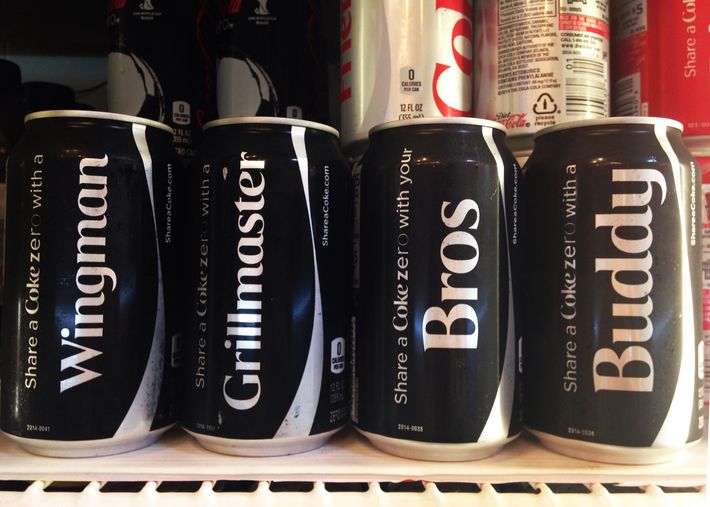
Usually, it’s women who are on the receiving end of dumb gendered marketing ploys. Advertisers seem to believe that our tiny hands and delicate sensibilities require things like special pink ballpoint pens and chocolates with empowering affirmations. Consumer goods from personal technology to sports paraphernalia are served with a generous side of infantilizing gender norms, under the edict of “pink it and shrink it.”
One noteworthy exception is diet soda: When it comes to no-calorie beverages, men are the ones who get the patronizing gender treatment. Advertisers will bend over backward to make a dude feel comfortably dudely about drinking diet soda — starting by eliminating the need to say the word diet.
Coke Zero — which has as many calories as Diet Coke (none) but no D-word — has always been pretty explicitly marketed to men. Last year, the company ran a series of ads that positioned the soda alongside video games and sports as the birthright of “guys being guys.” Now, the new “Share a Coke” campaign has managed to pander even more aggressively. In addition to the bottles with first names “from Aaron to Zoey,” Coca-Cola cans now come with generically gendered epithets. But where the Diet Coke cans extoll the quasi-empowerment now common in advertising to women — “BFF,” “Star,” and “Go-Getter” — the Coke Zero cans are still shockingly pandering: “Grillmaster,” “Wingman,” “Gamer,” and “Bros.”

I doubt the psychic wounds that make man fear the word diet can be healed by reassuring him he’s the “Grillmaster.” But Coca-Cola’s competitors don’t offer much of an improvement. Barely self-aware gender stereotypes are the best Pepsi and Dr. Pepper have come up with, too. Ads for Pepsi Max — the self-described “first diet cola for men” — suggest men are too extreme for Diet Pepsi.
The ten calories in Dr. Pepper Ten — compared to Diet Dr. Pepper’s none — make it explicitly “not for women,” according to a very poorly received commercial.
All of which would be amusingly cathartic (in the spirit of TMZ’s quest for gender parity in fat-shaming), except for one problem: The “men’s version,” in this case, is inherently better. Coke Zero and Pepsi Max are a technological improvement on Diet Coke and Pepsi — using a different combination of artificial sweeteners, they more closely approximate the flavor of full-calorie cola. Unlike Diet Coke, “this product tastes like Coke,” a Coca-Cola executive said shortly after its launch. “There’s a broad group of young adult males who are looking for full flavor … and, oh, by the way, it has zero calories.” Unlike young women, they have yet to be conditioned to masochistically love an objectively bad alternative because it is diet-friendly.




